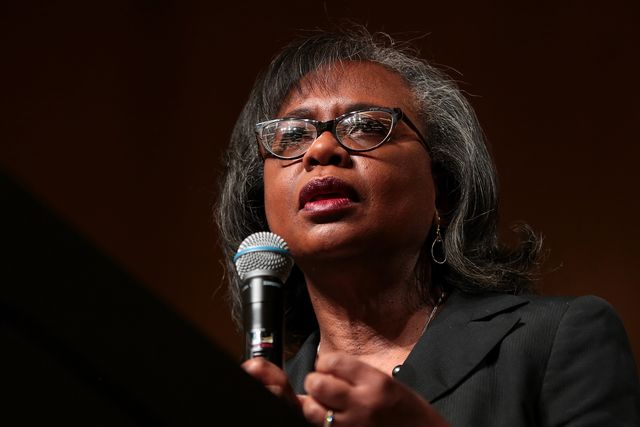Everyone knows Hollywood has a diversity problem. Which is to say, everyone knows Hollywood has white dudes who have been the only ones calling the shots for way, way too long. Before the coronavirus, this was an issue Anita Hill and the Hollywood Commission she chairs were ready to tackle head-on. But in a recent op-ed for Variety, Hill said that while her goals to combat discrimination and harassment are unwavering, the coronavirus — and the restructuring it has caused Hollywood to undergo — presents a chance for real change, with both worker safety and diversity.
The biggest coronavirus change that is likely here to stay after the pandemic is the prevalence of working from home. This means more online and one-on-one meetings. Hill said that new guidelines surrounding the proper protocol of such meetings are essential to ensure workers are entitled to the same anti-harassment and discrimination protections they were pre-COVID. Hill knows from firsthand experience how important it is to have easy to navigate systems and procedures in place that hear out and protect victims: in 1991, she testified at a Senate hearing that then-Supreme Court nominee Clarence Thomas had sexually harassed her for years. Senators called her a liar and doubted her sanity.
But merely reinforcing old rules won’t be enough, Hill argues. After COVID, the workplace is going to look different, and so specific rules to address these differences need to be implemented. Perhaps the biggest concern is that those who do face any sort of discrimination or abuse will not have access to others who can help them. “How will the entertainment industry keep its workers safe from harassment and discrimination when they are operating in decentralized “pods” or isolated workplaces where interaction with others is rare and systems or resources for reporting problems may not exist?” Hill asked.
But Hill isn’t only worried about about sexual and general harassment. During the Great Recession of 2008, Hill argued, diversity and inclusion initiatives all but stopped with the economic downfall, a correlation Hill fears we’ll see again with COVID, citing the approximately 350,000 jobs that have been lost in the entertainment industry. She said that this job loss necessitates that employers commit to diverse talent both on and off-screen.
In short, the restructuring prompted by the virus allows for some serious change that cannot and should not be solely women’s responsibility. Hill said at her talk in February, “I’m not here to change women. I’m not here to change young women and try to craft them into some sort of mini-men or female versions of males. I’m here to change the system. That’s what I’m here to change, and that’s who I want to speak to.”
Above all else, everyone deserves to feel and be safe, whether that be in their personal or professional lives. “The coronavirus pandemic best makes clear that everyone’s safety and well-being depends on the safety and well-being of each individual,” Hill said in the op-ed. “The message that we’re all in this together is popular today. Let us not forget it as we chart the course of the new reality ahead.”
Header Image: Gage Skidmore/Wikimedia Commons
More from BUST
Alison Roman, Chrissy Teigan, And The Cool Girl Trap
The Surprising History Of Women And Pockets
Alexandria Ocasio-Cortez Named Co-Chair Of Biden-Sanders Climate Change Task Force


